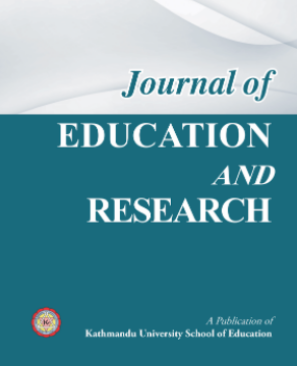
Beyond the Classroom: From Education for Rural Transformation to Learning Within Rural Transformation?
Original Article
Journal of Education and Research, Volume 5, Issue 2, 2015, 9-30, https://doi.org/10.3126/jer.v5i0.15728
Publication date: Mar 10, 2016
Views: 533 | Downloads: 359
How to cite this article
APA
In-text citation: (Pant, 2015)
Reference: Pant, A.-R. (2015). Beyond the Classroom: From Education for Rural Transformation to Learning Within Rural Transformation?. Journal of Education and Research, 5(2), 9-30. https://doi.org/10.3126/jer.v5i0.15728
Reference: Pant, A.-R. (2015). Beyond the Classroom: From Education for Rural Transformation to Learning Within Rural Transformation?. Journal of Education and Research, 5(2), 9-30. https://doi.org/10.3126/jer.v5i0.15728
Vancouver
In-text citation: (1), (2), (3), etc.
Reference: Pant AR. Beyond the Classroom: From Education for Rural Transformation to Learning Within Rural Transformation?. Journal of Education and Research. 2015;5(2):9-30. https://doi.org/10.3126/jer.v5i0.15728
Reference: Pant AR. Beyond the Classroom: From Education for Rural Transformation to Learning Within Rural Transformation?. Journal of Education and Research. 2015;5(2):9-30. https://doi.org/10.3126/jer.v5i0.15728
AMA
In-text citation: (1), (2), (3), etc.
Reference: Pant AR. Beyond the Classroom: From Education for Rural Transformation to Learning Within Rural Transformation?. Journal of Education and Research. 2015;5(2), 9-30. https://doi.org/10.3126/jer.v5i0.15728
Reference: Pant AR. Beyond the Classroom: From Education for Rural Transformation to Learning Within Rural Transformation?. Journal of Education and Research. 2015;5(2), 9-30. https://doi.org/10.3126/jer.v5i0.15728
Chicago
In-text citation: (Pant, 2015)
Reference: Pant, Anna-Robinson. "Beyond the Classroom: From Education for Rural Transformation to Learning Within Rural Transformation?". Journal of Education and Research 2015 5 no. 2 (2015): 9-30. https://doi.org/10.3126/jer.v5i0.15728
Reference: Pant, Anna-Robinson. "Beyond the Classroom: From Education for Rural Transformation to Learning Within Rural Transformation?". Journal of Education and Research 2015 5 no. 2 (2015): 9-30. https://doi.org/10.3126/jer.v5i0.15728
Harvard
In-text citation: (Pant, 2015)
Reference: Pant, A.-R. (2015). Beyond the Classroom: From Education for Rural Transformation to Learning Within Rural Transformation?. Journal of Education and Research, 5(2), pp. 9-30. https://doi.org/10.3126/jer.v5i0.15728
Reference: Pant, A.-R. (2015). Beyond the Classroom: From Education for Rural Transformation to Learning Within Rural Transformation?. Journal of Education and Research, 5(2), pp. 9-30. https://doi.org/10.3126/jer.v5i0.15728
MLA
In-text citation: (Pant, 2015)
Reference: Pant, Anna-Robinson "Beyond the Classroom: From Education for Rural Transformation to Learning Within Rural Transformation?". Journal of Education and Research, vol. 5, no. 2, 2015, pp. 9-30. https://doi.org/10.3126/jer.v5i0.15728
Reference: Pant, Anna-Robinson "Beyond the Classroom: From Education for Rural Transformation to Learning Within Rural Transformation?". Journal of Education and Research, vol. 5, no. 2, 2015, pp. 9-30. https://doi.org/10.3126/jer.v5i0.15728
ABSTRACT
Much research and policy has focused on improving the performance and reach of formal educational institutions in rural areas. Debates within education and development have been largely concerned with analysing the relationship between different levels of schooling and various indicators of well-being. Such research has usually been framed within an economistic discourse: associating education and learning primarily with schools and formal providers, and assuming that only formally educated people can facilitate development and rural transformation. This limited starting point has led to privileging investigation into formal learning and to a neglect of alternative lenses for researching people’s everyday learning in rural areas. Drawing on the methodology and findings of an IFAD-UNESCO project, this article proposes an alternative approach to researching and theorising learning in rural areas. In place of focusing on formal education and educational providers, the study team conducted ethnographic-style research on how young people learned skills and knowledge informally and exploring the relationship between informal, non-formal and formal learning. The findings challenged many assumptions around a linear ‘literacy first’ and teacher-centred model of development, revealing that so-called ‘illiterate’ people had often developed their own innovative strategies for learning new skills, such as mobile phones. The paper concludes by reflecting on the implications of this research study for educational researchers, policy makers and practitioners seeking to develop greater understanding of the complex relationship between education and rural livelihoods.
REFERENCES
---
LICENSE
This work is licensed under a Creative Commons Attribution 4.0 International License.
